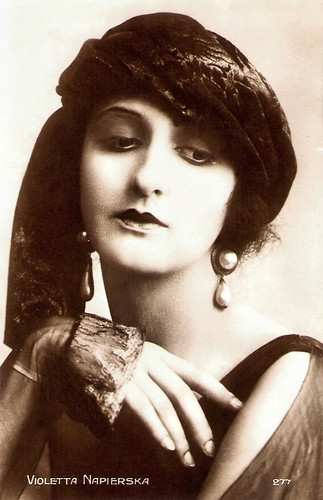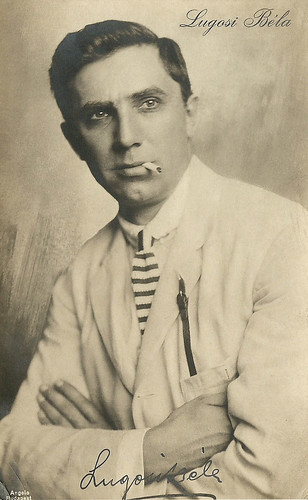Film actress Violetta Napierska (?-?) appeared mainly in the German silent cinema. She co-starred with Béla Lugosi and Lee Parry in the horror film Hypnose/Hypnosis (1920) and in several other films produced and directed by Richard Eichberg.

French postcard by Cinémagazine-Edition, Paris, no. 277.

Béla Lugosi. Hungarian postcard. Photo: Angelo, Budapest. Collection: Didier Hanson.
There is not much known about Violetta (sometimes Violette) Napierska.
From 1919 on she appeared in German silent films like Sünden der Eltern/Sins of the Elders (Richard Eichberg, 1919) and Nonne und Tänzerin/Nun and Dancer (Richard Eichberg, 1919), both starring German star Lee Parry.
She then appeared in Die Abenteuer der Marquise von Königsmarck/The Adventures of the Marquise of Königsmarck (Emmerich Hanus, 1920) with Heinrich Schroth. For Richard Eichberg-Film she next appeared in the two-part Der Fluch der Menschheit/The Curse of Man (Richard Eichberg, 1920) starring Lee Parry and Béla Lugosi.
According to Wikipedia Napierska was Lugosi’s mistress at the time. According to a MySpace blog on Lugosi, he had only fallen in love with her and he even wrote her a poem: “One (poem) I wrote while living in Germany, working in the Budapest Theatre. I had fallen in love with a very young girl by the name of Violetta Napierska. Regretfully, nothing ever developed from our acquaintance.”
Lugosi and Napierska worked together again on the film Hypnose/Hypnosis (Richard Eichberg, 1920) and the two-parter Der Tanz auf dem Vulkan/Dance on the Volcano (Richard Eichberg, 1920), both co-starring again Lee Parry. The U.S. version of the latter film was known as Daughter of the Night. For a long time, it was considered a lost film until an archive print was discovered in its American release version in the 1990s.
The success of these films led to another cooperation of the director and his stars: Ihre Hoheit die Tänzerin/Her Highness the Dancer (Richard Eichberg, 1922). The film was banned by the German Film Review Office and it could not to be shown in the Weimar Republic. The makers appealed, but the Office considered the film ‘corruptive’ and the appeal was rejected. A shortened version was again not approved. Finally in early 1923 a version of the film, now renamed Der Leidensweg der Eva Grunwald/The Ordeal of Eva Grunwald was approved, but considered suitable for adults only.
Napierska also starred in films of director Franz Osten such as in Die Kette der Schuld/The Chain of Guilt (Franz Osten, 1921) and Der Verfluchte/The Cursed (Franz Osten, 1921). Opposite Ludwig Trautmann she appeared in Die graue Macht/The gray power (Fred Stranz, 1923). Her last German film was Der Mitternachtszug/The Midnight Train (James Bauer, 1923).

Lee Parry. German postcard by Ross Verlag, no. 458/1, 1919-1924 (at the backside of the card is hand written: 1920). Photo: Alex Binder.

Mario Girotti. Italian postcard by Bromofoto, Milano (Milan), no. 1807.
Violetta Napierska moved to France, where she appeared in Le p'tit Parigot/The Small Parisian One (René Le Somptier, 1926), a serial in six parts, which starred Georges Biscot, and was based on a story by Paul Cartoux and Henri Decoin.
After that Violetta Napierska stayed in France and retired from the film business. After the introduction of sound film she returned in supporting parts in the films La coqueluche de ces dames/The darling of These Ladies (Gabriel Rosca, 1935) with Lisette Lanvin, and Coeur de gueux/Rogue’s Heart (Jean Epstein, 1936) starring Madeleine Renaud. She also appeared in the Italian version Cuor di vagabondo/Rogue’s Heart (Jean Epstein, 1936) with Renaud and Fosco Giachetti.
In 1955 she appeared in Italy in her final film La Vena d'Oro/The gold Vein (1955, Mauro Bolognini) about an oedipal relationship between a mother (Märta Torén) and her only son. As the son appeared the then 16-year-old Mario Girotti, who would become Spaghetti Western hero Terence Hill in 1967.
Violetta Napierska retired and was soon forgotten. When or where she passed away is not known. But in the music scene her name is not forgotten. In 1997 the American band Darling Violetta took their name from the salutation used by Béla Lugosi in a poem for Violetta Napierska:
My Darling Violetta,
Slumber envelops your beautiful face
And a dream grips your soul in embrace;
I will guard you.
You are my dream every night, every day,
And regardless of where you might stay,
I will seek you.
Then, when you want to forget all the world,
And fly to my arms like a bird,
I will love you.
Signed,
Bela
Videoclip of Spolied and Rotten by Darling Violetta. Source: GMiddleman (YouTube).
Sources: Béla Lugosi (MySpace), Thomas Staedeli (Cyranos), Wikipedia, and IMDb.

French postcard by Cinémagazine-Edition, Paris, no. 277.

Béla Lugosi. Hungarian postcard. Photo: Angelo, Budapest. Collection: Didier Hanson.
'Béla Lugosi’s Mistress'
There is not much known about Violetta (sometimes Violette) Napierska.
From 1919 on she appeared in German silent films like Sünden der Eltern/Sins of the Elders (Richard Eichberg, 1919) and Nonne und Tänzerin/Nun and Dancer (Richard Eichberg, 1919), both starring German star Lee Parry.
She then appeared in Die Abenteuer der Marquise von Königsmarck/The Adventures of the Marquise of Königsmarck (Emmerich Hanus, 1920) with Heinrich Schroth. For Richard Eichberg-Film she next appeared in the two-part Der Fluch der Menschheit/The Curse of Man (Richard Eichberg, 1920) starring Lee Parry and Béla Lugosi.
According to Wikipedia Napierska was Lugosi’s mistress at the time. According to a MySpace blog on Lugosi, he had only fallen in love with her and he even wrote her a poem: “One (poem) I wrote while living in Germany, working in the Budapest Theatre. I had fallen in love with a very young girl by the name of Violetta Napierska. Regretfully, nothing ever developed from our acquaintance.”
Lugosi and Napierska worked together again on the film Hypnose/Hypnosis (Richard Eichberg, 1920) and the two-parter Der Tanz auf dem Vulkan/Dance on the Volcano (Richard Eichberg, 1920), both co-starring again Lee Parry. The U.S. version of the latter film was known as Daughter of the Night. For a long time, it was considered a lost film until an archive print was discovered in its American release version in the 1990s.
The success of these films led to another cooperation of the director and his stars: Ihre Hoheit die Tänzerin/Her Highness the Dancer (Richard Eichberg, 1922). The film was banned by the German Film Review Office and it could not to be shown in the Weimar Republic. The makers appealed, but the Office considered the film ‘corruptive’ and the appeal was rejected. A shortened version was again not approved. Finally in early 1923 a version of the film, now renamed Der Leidensweg der Eva Grunwald/The Ordeal of Eva Grunwald was approved, but considered suitable for adults only.
Napierska also starred in films of director Franz Osten such as in Die Kette der Schuld/The Chain of Guilt (Franz Osten, 1921) and Der Verfluchte/The Cursed (Franz Osten, 1921). Opposite Ludwig Trautmann she appeared in Die graue Macht/The gray power (Fred Stranz, 1923). Her last German film was Der Mitternachtszug/The Midnight Train (James Bauer, 1923).
Lee Parry. German postcard by Ross Verlag, no. 458/1, 1919-1924 (at the backside of the card is hand written: 1920). Photo: Alex Binder.
Mario Girotti. Italian postcard by Bromofoto, Milano (Milan), no. 1807.
Oedipal Relationship
Violetta Napierska moved to France, where she appeared in Le p'tit Parigot/The Small Parisian One (René Le Somptier, 1926), a serial in six parts, which starred Georges Biscot, and was based on a story by Paul Cartoux and Henri Decoin.
After that Violetta Napierska stayed in France and retired from the film business. After the introduction of sound film she returned in supporting parts in the films La coqueluche de ces dames/The darling of These Ladies (Gabriel Rosca, 1935) with Lisette Lanvin, and Coeur de gueux/Rogue’s Heart (Jean Epstein, 1936) starring Madeleine Renaud. She also appeared in the Italian version Cuor di vagabondo/Rogue’s Heart (Jean Epstein, 1936) with Renaud and Fosco Giachetti.
In 1955 she appeared in Italy in her final film La Vena d'Oro/The gold Vein (1955, Mauro Bolognini) about an oedipal relationship between a mother (Märta Torén) and her only son. As the son appeared the then 16-year-old Mario Girotti, who would become Spaghetti Western hero Terence Hill in 1967.
Violetta Napierska retired and was soon forgotten. When or where she passed away is not known. But in the music scene her name is not forgotten. In 1997 the American band Darling Violetta took their name from the salutation used by Béla Lugosi in a poem for Violetta Napierska:
My Darling Violetta,
Slumber envelops your beautiful face
And a dream grips your soul in embrace;
I will guard you.
You are my dream every night, every day,
And regardless of where you might stay,
I will seek you.
Then, when you want to forget all the world,
And fly to my arms like a bird,
I will love you.
Signed,
Bela
Videoclip of Spolied and Rotten by Darling Violetta. Source: GMiddleman (YouTube).
Sources: Béla Lugosi (MySpace), Thomas Staedeli (Cyranos), Wikipedia, and IMDb.
2 comments:
Hey did you just copy/paste that postcards website or did they copy you and did you make this up out of thin air?
This info is only shared by you & p.w.
Nothing at any Bela Lugosi websites or bios.
What gives, bro?? Please provide sources!
Also, you're CONTRADICTING YOURSELF BY quoting Bela (out of where?) REGRETFULLY saying NOTHING EVER developed.
NOTHING. Nothing as in no kiss, no sex. So not his mistress.
Post a Comment